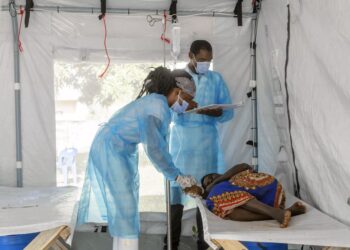During a protest by Palmeiras’ residents, in the Manhica district, Maputo Province, on 22 January against alleged ineffectiveness of law and order officers in fighting crime that is rising alarmingly, the police again deliberately used live ammunition to disperse unarmed and unprotected people. Inacio Dina, spokesman for the Mozambican National Police (PR) General Command, downplayed the situation and ignored the fact that one of the basic human rights was violated -the right to life -when his colleagues killed a youth whose family undoubtedly will not receive compensation from the state.
Dina seemed to think that this was normal when he said that “the use of live ammunition” is part of “the resources that the police have and use” always “in its work.” Dina also described the people who displayed their discontent regarding the police’! s ineffectiveness in fighting crime as “a handful of citizens” who “jeopardized the tranquillity of millions of other citizens (…).” In his opinion, residents took advantage of national highway EN1 being a vital link between the south/centre and north of the country and erected barricades to prevent the movement of people and goods for three hours, a “serious situation” that allegedly “paralysed the state.”
Still ignoring the fact that the police have a duty in their work -even in the case of significant civil disobedience -to respect universally accepted standards, especially when safeguarding the physical integrity of citizens, Dina, said that the police “used the force that it deemed proportional to the type of protest occurring at the location.”
But despite these dismissive statements, the opposite happened in Palmeiras. An officer fired to kill and will not be held accountable. In fact it is for this and other macabre reasons that Amnesty Internati! onal described the Mozambican police as one that “appears to have a license to kill and the weak accountability system allows this.”
In Palmeiras, the local law and order officers, unable to contain popular anger, called for reinforcements from the capital, which sent anti-riot officers armed to the teeth and who in addition to not knowing how to talk to crowds, were up to their tricks similarly to what has happened a little throughout the country when there is upheaval.
One person died and Dina said that “unfortunately we regret the loss of life (…). It was not the police’s intention” that things ended tragically, but rather it wished to “restore public order and restore circulation to any blocked EN1 stretch.”
Furthermore, Dina said that as some people were persuaded not to join in the confusion, others got more motivated and tried to show their “strength in an effort to incapacitate the police, something that must not happen. The police is a state institution with the power to ensure that no citizen disrupt! s the tranquillity of others (…).
“We condemn the demonstrations, even if sporadic, that have gained ground in some areas of the country. People who wanted justice decided to demonstrate, unfortunately violently. During the demonstration, according to colleagues stationed in the area, the residents demanded that the police arrest a man suspected of committing a crime” because his accomplices were already in custody, according to Dina.
For the PRM, the sensible thing in the event of “illegality and the need for police intervention” would be a “civilized communication so that the suspect was identified and arrested if necessary,” explained Dina, reiterating that “erecting barricades on a road and preventing circulation on a public highway is a serious crime.”
Dina said that taking justice into one’s own hands is also condemnable, especially what happens in Beira where residents mercilessly lynch alleged thieves because according to them the p! olice release them and they perpetrate more thefts, rapes, and various other physical attacks in neighbourhoods.
“This is not the way to collaborate with the police to ensure public safety. Police posts are accessible and there should be no fear” of going there to report any anomalies. “Only by trusting the police can there be the comfort and security” desired.


